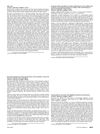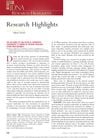 November 2023 in “International Journal of Dermatology”
November 2023 in “International Journal of Dermatology” Most women with long-term, widespread hair loss need a tissue examination for an accurate diagnosis.
 September 2023 in “Clinical, Cosmetic and Investigational Dermatology”
September 2023 in “Clinical, Cosmetic and Investigational Dermatology” Higher SHBG levels are linked to less severe hair loss in women, but vitamin D levels don't seem to affect hair loss.

Thyroid problems can cause hair loss and change hair texture.
 June 2023 in “Faculty Opinions – Post-Publication Peer Review of the Biomedical Literature”
June 2023 in “Faculty Opinions – Post-Publication Peer Review of the Biomedical Literature” Bicalutamide mesotherapy improved hair density in women with hair loss and was well received.
 April 2023 in “Dermatologica Sinica”
April 2023 in “Dermatologica Sinica” Sex hormones affect hair growth and loss, and treatments for related hair diseases include various medications, hair transplantation, and light therapy.
 April 2022 in “JAAD International”
April 2022 in “JAAD International” Women with frontal fibrosing alopecia have similar vitamin D levels to those with other hair loss types, suggesting vitamin D is not a key factor in this condition.
January 2021 in “CRC Press eBooks” Hair loss can have various causes and treatments vary in effectiveness.
 January 2020 in “대한피부과학회지”
January 2020 in “대한피부과학회지” Dutasteride effectively increases hair density in women with hair loss.
 August 2019 in “Journal of The American Academy of Dermatology”
August 2019 in “Journal of The American Academy of Dermatology” 5% minoxidil foam effectively regrows hair in women, with postmenopausal women seeing the most improvement.
 July 2019 in “Journal of the Formosan Medical Association”
July 2019 in “Journal of the Formosan Medical Association” Melatonin may help with nerve pain, a hepatitis C drug is effective but has side effects, a treatment for mouth sores works but can cause blood issues, ear reconstruction with an implant is safe, HIV transmission from mother to child in Taiwan is now 0% with treatment, certain blood problems are more common in people with a tongue condition, a gene and being overweight are linked to hair loss in some women, a new technique could reduce radiation for lung nodule patients, a hepatitis treatment may lower cancer recurrence after a procedure, and adding extra screening improves tuberculosis detection in patients with lung infections.
 September 2018 in “Reactions Weekly”
September 2018 in “Reactions Weekly” Two women had skin reactions from a hair loss treatment and got better after stopping use.
 January 2018 in “Clinical approaches and procedures in cosmetic dermatology”
January 2018 in “Clinical approaches and procedures in cosmetic dermatology” Low-Level Laser Therapy might be an effective alternative hair loss treatment for some people.
 January 2017 in “Clinical approaches and procedures in cosmetic dermatology”
January 2017 in “Clinical approaches and procedures in cosmetic dermatology” Low-Level Laser Therapy might be a good alternative for hair loss when other treatments fail, but its effectiveness varies and more research is needed.

Follicular unit grafting is a procedure used to treat hair loss, where small hair grafts are placed into the scalp, with future treatments likely to involve smaller incisions and cell-based therapies.
 September 2016 in “Medical Journal of Australia”
September 2016 in “Medical Journal of Australia” Planting trees and doing yoga might make you feel better; yoga can help with asthma symptoms, and certain treatments can improve female hair loss.
 March 2016 in “Journal of the European Academy of Dermatology and Venereology”
March 2016 in “Journal of the European Academy of Dermatology and Venereology” The April 2016 JEADV issue covered various dermatology topics, including psoriasis, psoriatic arthritis, mTOR inhibitors, autoimmune diseases, photodynamic therapy, viral DNA in skin diseases, chronic hand eczema, and female hair loss.
 September 2015 in “British Journal of Dermatology”
September 2015 in “British Journal of Dermatology” Most clinicians follow discharge guidelines, many lupus patients don't use sunscreen regularly, dithranol is effective for psoriasis, biopsy methods should be based on lesion type, voriconazole may raise skin cancer risk, a new scale can help diagnose female hair loss early, and most melanomas may develop from existing moles.
 July 2015 in “Cambridge University Press eBooks”
July 2015 in “Cambridge University Press eBooks” The document concludes that treatments for female hair loss and excess body hair are available, but managing expectations is important.

The article suggests using "to heal from" for a more caring approach to treating women's hair loss and discusses the impact of doctors' beliefs on treatment.
 May 2014 in “Hair transplant forum international”
May 2014 in “Hair transplant forum international” Scalp tools, tracking progress, targeting scalp inflammation, and avoiding certain hair treatments can improve female hair loss treatment.
 May 2013 in “Hair transplant forum international”
May 2013 in “Hair transplant forum international” The congress discussed using growth factors for hair treatments and a workshop focused on female hair loss.
 March 2012 in “Journal of The American Academy of Dermatology”
March 2012 in “Journal of The American Academy of Dermatology” Hair casts are often mistaken for head lice, scalp pain in hair loss is linked to certain nerve factors, eyelash growth treatment is safe and effective, and nail shedding in children may follow hand-foot-mouth disease.
 January 2012 in “Yearbook of Dermatology and Dermatologic Surgery”
January 2012 in “Yearbook of Dermatology and Dermatologic Surgery” Taking finasteride daily can effectively and safely increase hair density and thickness for women with hair loss.
 January 2012 in “Yearbook of Dermatology and Dermatologic Surgery”
January 2012 in “Yearbook of Dermatology and Dermatologic Surgery” Iron deficiency is not more common in women with hair loss, and neurogenic rosacea may need different treatment.
 November 2011 in “Informa Healthcare eBooks”
November 2011 in “Informa Healthcare eBooks” Environmental, chemical, mechanical, and personal health factors can all damage hair and contribute to hair loss or changes in hair quality.
 July 2011 in “Journal of the Dermatology Nurses’ Association”
July 2011 in “Journal of the Dermatology Nurses’ Association” Antibiotic ointment and petrolatum ointment heal wounds similarly; iron deficiency isn't linked to certain hair loss in women; griseofulvin and terbinafine are equally effective for fungal scalp infections but work better on different types.
 May 2010 in “Dermatologic Clinics”
May 2010 in “Dermatologic Clinics” The document concludes that new treatments for skin conditions are complex but effective, including spironolactone for female hair loss and propranolol for infantile hemangiomas.
 November 2009 in “Medical & surgical dermatology”
November 2009 in “Medical & surgical dermatology” The document concludes that Borrelia afzelii causes a skin condition in France, a gene is linked to hair loss in Caucasian women, and various genetic mutations affect skin diseases.
 June 2008 in “British Journal of Dermatology”
June 2008 in “British Journal of Dermatology” UK medical students lack dermatology education, liver biopsy patients with risk factors show more fibrosis, and certain fungi resist drugs due to melanin; genetics may influence female hair loss.
 April 2003 in “Experimental Dermatology”
April 2003 in “Experimental Dermatology” The workshop highlighted the genetic links and psychological impacts of hair loss and skin disorders.





























